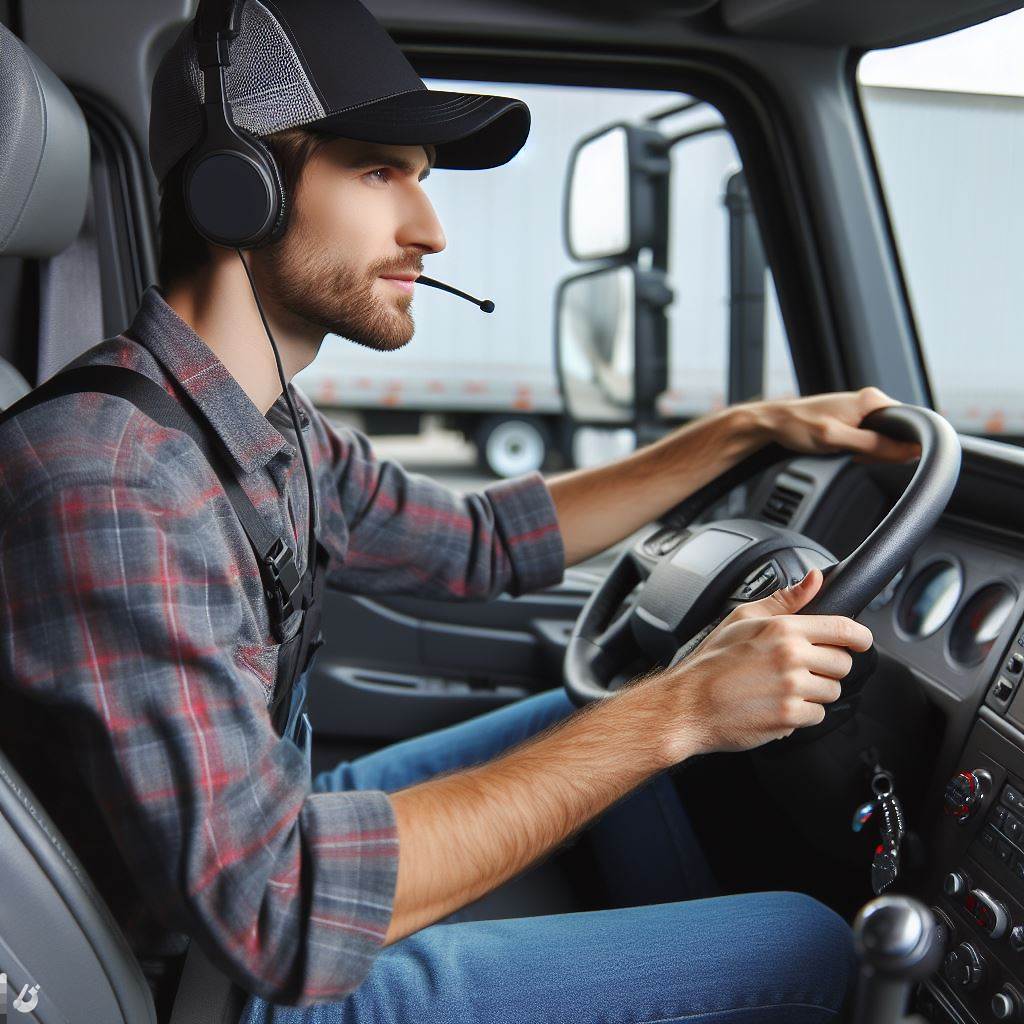Introduction
Brief overview of the UK trucking industry
The UK trucking industry is essential for transporting goods across the country, ensuring the functioning of the economy.
The UK trucking industry is a vital component of the nation’s economy, facilitating the movement of goods efficiently.
Comprising diverse fleets, it navigates both urban and rural routes.
The industry’s resilience and adaptability contribute significantly to supply chains, supporting businesses and ensuring the seamless delivery of goods across the country.”
Introduction to the role of technology in transforming the industry
Technology plays a crucial role in transforming this industry, enhancing operations and efficiency.
Technology is reshaping the trucking industry, bringing unprecedented advancements.
From route optimization to real-time tracking, innovations like telematics and IoT are enhancing efficiency and safety.
Embracing these transformative technologies is pivotal for a modern, streamlined, and future-ready trucking landscape
Importance of Technology in UK Trucking
In the modern world, technology plays a crucial role in improving efficiency, safety, and sustainability in the UK trucking sector.
By embracing technological advancements, the industry has revolutionized various aspects, including routing, tracking, and communication systems.
1. Improved Efficiency
Advanced GPS systems have allowed truck drivers to optimize their routes, reducing fuel consumption and delivery time.
Real-time traffic updates and intelligent routing algorithms help drivers avoid congestion, increasing overall productivity.
Electronic logging devices (ELDs) have streamlined record-keeping, eliminating paperwork and reducing administrative burdens.
Automation tools, such as load management software, optimize scheduling and load planning, minimizing empty miles and maximizing truck utilization.
2. Enhanced Safety
Telematics systems monitor driver behavior, providing feedback on speeding, harsh braking, and other risky maneuvers, promoting safer driving habits.
Personalized UK Career Consulting
Receive tailored career guidance designed just for you. Get actionable steps and expert support to boost your career in 1-3 days. Take control of your career now.
Get StartedCollision avoidance systems, equipped with sensors and cameras, alert drivers to potential hazards and prevent accidents.
Intelligent transportation systems (ITS) enable better traffic management, reducing the risk of accidents caused by congestion and inefficient road conditions.
Digital tachographs monitor driver hours, ensuring compliance with regulations and preventing fatigue-related incidents.
3. Promoting Sustainability
Technology enables eco-driving techniques through real-time feedback on fuel consumption, encouraging drivers to adopt fuel-efficient practices.
Smart fleet management systems help optimize routes, reducing greenhouse gas emissions and minimizing the environmental impact of trucking operations.
Alternative fuel technologies, such as electric and hydrogen-powered trucks, are being integrated, decreasing dependence on fossil fuels and reducing carbon emissions.
Efficient supply chain management systems minimize waste and promote sustainable practices, contributing to a greener and more environmentally friendly industry.
4. Revolutionizing Communication
Mobile apps and digital platforms facilitate seamless communication between truck drivers, fleet managers, and customers.
Real-time shipment tracking systems enable stakeholders to monitor cargo status and provide accurate delivery estimations.
Integrated communication systems allow for immediate response to unforeseen circumstances, enhancing customer service and satisfaction.
Electronic proof of delivery (ePOD) systems eliminate paperwork, enable faster document processing, and improve operational efficiency.
In summary, technology has become indispensable in the UK trucking sector, bringing numerous benefits in terms of efficiency, safety, sustainability, and communication.
Embracing and leveraging these technological advancements will continue to drive the industry forward, ensuring its constant evolution and development.
Read: Interview: Veteran UK Train Conductor
Your Dream Job Starts with a Perfect CV
Get a tailored CV and cover letter that captures your unique strengths and stands out in your industry. Let us help you make an unforgettable first impression.
Get StartedAutomated Vehicle Systems
The concept of automated truck systems and their potential impact on the UK trucking industry
Automated truck systems refer to the use of technology to operate trucks without direct human intervention.
These systems have the potential to significantly impact the UK trucking industry.
Benefits associated with the adoption of autonomous trucks
One of the main benefits of adopting autonomous trucks is increased efficiency in transportation operations.
Autonomous trucks can drive continuously without the need for rest, resulting in faster and more timely deliveries.
This increased efficiency can lead to cost savings for trucking companies and improved service for customers.
Reduced human error is another advantage associated with the adoption of automated truck systems.
Human errors, such as fatigue, distraction, or speeding, can be eliminated with autonomous technology.
This can lead to safer roads and reduce the number of accidents caused by human mistakes.
Challenges associated with the adoption of autonomous trucks
However, the adoption of autonomous trucks also presents several challenges for the UK trucking industry.
One of the key challenges is the need for infrastructure upgrades to support automated truck systems.
Autonomous trucks require advanced technology infrastructure, such as sensors, connectivity, and GPS systems.
These upgrades come with additional costs and investments for both trucking companies and infrastructure providers.
Another challenge is the potential impact on the job market and workforce in the trucking industry.
With automated truck systems, there may be a reduced need for human drivers, leading to potential job displacement.
Optimize Your LinkedIn for Success
Boost your LinkedIn profile with a professional bio, keyword-rich headline, and strategic recommendations that attract recruiters. Stand out from the crowd and get noticed.
Optimize NowThis can have economic and social implications, requiring policymakers to address potential job losses and retraining needs.
Additionally, the safety and reliability of automated truck systems need to be thoroughly tested and validated.
Proper regulations and standards must be in place to ensure the safe operation of autonomous trucks.
Furthermore, cybersecurity risks need to be addressed to protect autonomous truck systems from potential cyber threats.
Overall, while automated truck systems offer numerous benefits to the UK trucking industry, their adoption requires careful consideration.
The potential impact on efficiency, safety, infrastructure, and jobs needs to be weighed against the challenges and costs associated with implementation.
With proper planning, regulations, and investments, the UK trucking industry can harness the potential of automated truck systems and drive towards a more efficient and technologically advanced future.
Read: UK Trucking: Urban vs Rural Routes
Telematics and Fleet Management
Telematics and fleet management systems have revolutionized the trucking industry, providing real-time data on vehicle performance, fuel efficiency, and driver behavior.
These systems offer numerous benefits for trucking companies, including improved operational efficiency, cost savings, and enhanced safety measures.
How telematics and fleet management systems have transformed the trucking industry
1. Real-time data on vehicle performance
Telematics and fleet management systems enable trucking companies to monitor various aspects of their vehicles in real-time.
This includes metrics such as engine performance, speed, and tire pressure.
With this information at their fingertips, companies can proactively address maintenance issues, preventing breakdowns and minimizing downtime.
2. Fuel efficiency optimization
Another significant advantage of telematics and fleet management systems is their ability to track fuel consumption.
These systems collect data on factors that affect fuel efficiency, such as idling time, aggressive driving behavior, and route optimization.
By analyzing this information, companies can identify areas for improvement and implement strategies to reduce fuel costs, ultimately resulting in substantial savings.
3. Driver behavior monitoring
Telematics technology coupled with fleet management systems allows companies to monitor driver behavior and identify potential risks.
Parameters such as harsh braking, acceleration, and speeding can be tracked, providing insights into drivers’ habits.
This data enables companies to address unsafe driving practices, implement training programs, and incentivize safe behavior. Ultimately, this contributes to enhanced road safety and reduced accident rates.
Benefits of these systems for trucking companies
Enhanced operational efficiency
Telematics and fleet management systems streamline various operational processes, improving overall efficiency.
These systems automate tasks such as route planning, dispatching, and load optimization.
By optimizing routes and efficiently allocating resources, companies can decrease delivery times, boost productivity, and enhance customer satisfaction.
Automating paperwork processes also reduces administrative burden, enabling employees to focus on core responsibilities.
Cost savings and financial benefits
Implementing telematics and fleet management systems can lead to significant cost savings for trucking companies.
By accurately tracking fuel consumption, minimizing vehicle downtime, and reducing maintenance costs through proactive repairs, companies experience substantial financial benefits.
Additionally, efficient route planning and load optimization reduce mileage and fuel expenses, positively impacting the bottom line.
Improved safety measures
Telematics and fleet management systems play a crucial role in enhancing safety measures within the trucking industry.
Real-time monitoring of driver behavior allows companies to identify risky practices and intervene with appropriate training or disciplinary actions.
Moreover, these systems enable companies to track vehicle locations, reduce theft risks, and implement emergency response protocols promptly.
In essence, telematics and fleet management systems have transformed the trucking industry by providing real-time data on vehicle performance, fuel efficiency, and driver behavior.
The benefits of these systems for trucking companies are extensive, including improved operational efficiency, cost savings, and enhanced safety measures.
Embracing these technologies is essential for companies looking to optimize their operations and remain competitive in the rapidly evolving trucking landscape.
Read: Stress Management for Bus Drivers

Freight Marketplace Platforms
Emergence of digital freight marketplaces in the UK
The emergence of digital freight marketplaces in the UK has revolutionized the trucking industry.
These platforms connect shippers, carriers, and brokers, streamlining the process of finding loads and booking trucks.
Advantages of using these platforms
Increased transparency
One of the key advantages of using these freight marketplace platforms is increased transparency. Through these platforms, shippers can access real-time information about available trucks and their current locations.
This transparency helps shippers make informed decisions and choose the most suitable carrier for their needs.
Reduced costs
Additionally, these platforms provide reduced costs for all parties involved.
Shippers can find carriers that offer competitive rates, while carriers can optimize their operations by finding backloads to minimize empty miles.
This cost-efficiency benefits everyone in the supply chain, resulting in cost savings and increased profitability.
Improved load matching capabilities
Another benefit of using these digital freight marketplaces is improved load matching capabilities.
Traditionally, finding the right carrier for a specific load could be a time-consuming and challenging process.
However, these platforms leverage advanced algorithms to match loads with available carriers efficiently.
This technology-driven approach ensures quicker load bookings and reduced downtime for carriers.
Collaboration within the industry
Furthermore, these freight marketplaces promote collaboration within the industry. By connecting shippers, carriers, and brokers in a centralized platform, communication and collaboration become more streamlined.
This enables better coordination, reduces administrative tasks, and fosters stronger relationships between the different players in the supply chain.
These platforms also offer additional services and features that enhance the overall experience for shippers, carriers, and brokers.
For example, some platforms provide real-time tracking and monitoring capabilities, allowing shippers to track their cargo at any given point during transportation.
This added visibility gives shippers peace of mind and enables them to provide accurate updates to their customers.
Furthermore, digital freight marketplaces often offer integrated payment systems, eliminating the need for manual invoicing and payment processes.
This automation reduces the chances of errors and simplifies the financial transactions between shippers, carriers, and brokers.
Generally, the emergence of digital freight marketplaces in the UK has significantly transformed the trucking industry.
These platforms connect shippers, carriers, and brokers, simplifying the process of finding loads and booking trucks.
The advantages of using these platforms include increased transparency, reduced costs, improved load matching capabilities, enhanced collaboration, and additional services and features.
As technology continues to advance, it is evident that these digital marketplaces will play an increasingly crucial role in the future of UK trucking
Read: UK Train Operators: Salary Insights
Electric and Alternative Fuel Vehicles
Electric and alternative fuel vehicles play a crucial role in the UK trucking industry’s efforts to reduce carbon emissions and achieve sustainability goals.
However, their widespread adoption comes with both challenges and opportunities.
The Role of Electric and Alternative Fuel Vehicles
- Electric and alternative fuel vehicles offer a greener solution for the UK trucking industry by significantly reducing carbon emissions.
- These vehicles contribute to the achievement of sustainability goals, as they rely on clean and renewable energy sources.
- Electric and alternative fuel vehicles provide an opportunity for the industry to showcase its commitment to environmental protection.
Challenges with Widespread Adoption
- One major challenge is the limited charging infrastructure for electric trucks across the UK.
- Without an extensive network of charging stations, the practicality and widespread adoption of electric trucks are hindered.
- Another challenge is the range limitations of electric trucks, which affects the distance they can travel on a single charge.
- Longer charging times compared to refueling conventional trucks can lead to longer downtimes, impacting the efficiency of trucking operations.
- Initial costs of electric trucks and alternative fuel vehicles are often higher compared to traditional diesel trucks.
Opportunities for Overcoming Challenges
- Expanding the charging infrastructure to include more stations along major trucking routes is crucial for the widespread adoption of electric trucks.
- Government and private sector partnerships can play a vital role in funding the development and establishment of charging infrastructure.
- Innovation in battery technology can lead to increased range and faster charging times, making electric trucks more practical for long-haul journeys.
- Financial incentives such as tax breaks and grants for purchasing electric and alternative fuel vehicles can help offset the initial higher costs.
- Collaboration between truck manufacturers, energy providers, and logistics companies can drive the development and availability of more sustainable trucking options.
Electric and alternative fuel vehicles have the potential to revolutionize the UK trucking industry by significantly reducing carbon emissions and contributing to sustainability goals.
However, challenges such as limited charging infrastructure and range limitations need to be addressed for their widespread adoption.
Opportunities lie in expanding the charging network, advancing battery technology, and providing financial incentives.
With collective efforts, the industry can overcome these challenges and achieve a more sustainable future for UK trucking.
Impact on Jobs and Workforce
As technology continues to infiltrate the UK trucking industry, it is vital to address concerns about its impact on jobs and the existing workforce.
While there are potential disruptions to traditional roles, there is also a demand for upskilling and the emergence of new job opportunities:
Concerns about the impact of technology on jobs in the trucking industry
With the integration of technology, there are concerns about job losses in the trucking industry. It is crucial to evaluate and address these concerns while realizing the potential benefits.
- Potential disruptions to traditional roles: The advent of technology in trucking may disrupt traditional roles that were once necessary for manual operations, such as driving or physical cargo handling.
- Upskilling for the workforce: To adapt to technological advancements, it becomes imperative for the workforce to upskill and acquire new knowledge and expertise to meet the changing demands of the industry.
- Training programs and collaborations: Trucking companies can develop training programs and collaborate with educational institutions to provide workers with the necessary skills to operate and maintain technology-driven systems.
New job opportunities that emerge with the integration of technology
While some roles may be replaced, the integration of technology also brings forth new job opportunities that didn’t exist previously.
- Specialized maintenance technicians: The increased reliance on technology creates a demand for specialized maintenance technicians who can ensure the smooth operation of advanced trucking systems.
- Software engineers: With the integration of software and automation, software engineers play a crucial role in developing and maintaining the technology used in the trucking industry.
- Data analysts and scientists: As technology collects vast amounts of data, there is a need for professionals who can analyze and make sense of this information to improve efficiencies and decision-making processes.
- Logistics coordinators: As technology streamlines operations, there is an increased need for logistics coordinators who can oversee the integration of technology into the supply chain and ensure smooth operations.
- Customer support specialists: With the rise of technology, customer support specialists with technical expertise are required to assist clients and troubleshoot any issues that may arise during operations
- Innovative roles: Technology opens up avenues for innovative roles, such as drone operators for last-mile delivery, virtual reality trainers for simulation-based training, or experts in cybersecurity for data protection.
While it is essential to acknowledge concerns about job displacement due to technology, it is equally important to recognize the potential for upskilling and the emergence of new and exciting job opportunities.
By investing in training programs and collaborating across sectors, the trucking industry can ensure a smooth transition towards a technologically-driven future while supporting the current workforce and facilitating their adaptation to changes in the industry.
Ultimately, the integration of technology in UK trucking has the potential to revolutionize the sector, enhance efficiency, and create a demand for new skill sets.
Conclusion
Summary of the key points discussed in the blog post
In the end, the role of technology in the UK trucking industry has brought significant benefits.
Overall positive impact of technology on the UK trucking industry
Technology has improved efficiency, safety, and sustainability in trucking operations.
For example, GPS systems have helped optimize route planning and avoid traffic congestion.
Telematics and onboard sensors have provided real-time data to monitor vehicle performance and maintenance needs.
Furthermore, the adoption of electric and autonomous trucks has the potential to revolutionize the industry.
These developments reduce carbon emissions and make transportation more eco-friendly.
However, there are challenges that come with the adoption of technology.
Truck drivers need to acquire new skills to operate and maintain advanced tech-driven vehicles.
There are also concerns about job displacement and the need for regulatory frameworks to address safety and ethical implications.
Emphasis on the importance of embracing and adapting to technological advancements for the industry’s future success.
Despite these challenges, embracing and adapting to technological advancements is crucial for the industry’s future success.
The positive impact of technology will continue to drive productivity, efficiency, and sustainability in the UK trucking industry.
Companies that invest in tech solutions will enjoy competitive advantages and meet customer demands effectively.
To thrive in the evolving landscape, industry stakeholders must keep pace with technological advancements.
Efforts should be made to train and educate trucking professionals and establish collaboration between technology developers and the industry.
By doing so, the UK trucking industry can fully harness the benefits of technology and remain at the forefront in the global market.
[E-Book for Sale]
500 Cutting-Edge Tech Startup Ideas for 2024 & 2025: Innovate, Create, Dominate
$19.99 • 500 Tech Startup Ideas • 62 pages
You will get inspired with 500 innovative tech startup ideas for 2024 and 2025, complete with concise descriptions to help you kickstart your entrepreneurial journey in AI, Blockchain, IoT, Fintech, and AR/VR.




